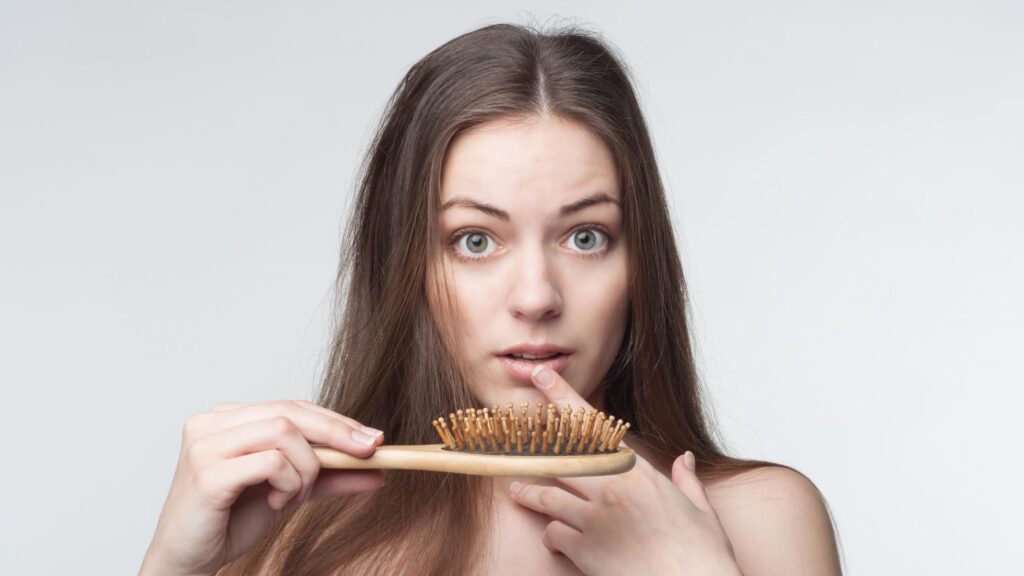How to deal with hair fall after delivery?

While you’re trying to adjust to your new normal self after delivery and adjust to your new routine you might witness something out of the blue.
Postpartum shedding or hair fall after delivery is a distressing condition that a lot of new mothers experience after giving birth. But worry not my dear readers!
Hair Fall after delivery is completely normal and you will go back to your natural, lustrous hair in no time.
Keep reading to know more about what is postpartum shedding, why it happens, and how to deal with hair fall after delivery.
What is postpartum hair fall?

Postpartum hair loss is a temporary phenomenon that usually starts around 3-4 months after delivery. In this, you might experience a high amount of hair loss every time you comb your hair or rinse it. But do not panic when you see a comb entangled with your or a clogged drain. This is completely normal. So relax and enjoy motherhood.
Causes for hair fall after delivery

Your hair usually grows in a cyclical phase. This consists of three phases, namely; growth, resting, and shedding. During pregnancy, the hormonal changes that take place to promote hair growth.
This means that your hair stays in the growth phase throughout your pregnancy. An increase in the levels of estrogen also improves blood flow and circulation which strengthens your roots.
During this time a very small amount of hair stays in the resting phase which is why the overall hair fall shedding is low. As an outcome of this, women have stronger and thicker hair during pregnancy.
But after delivery, you experience hormonal changes all over again. Your body goes back to its normal levels of hormones. It is because of this that there is a drop in the estrogen levels in your body. This drop leads to the shedding phase as the hair follicles go into the rest mode which leads to postpartum hair loss.
So it’s all about the game of hormones!
It usually takes about 3-4 months for that extra hair growth to enter into this shedding phase and you might experience hair fall around this time. But, it is a temporary situation and goes away in around 6-8 months.
Ways to deal with postpartum shedding

It is a natural process therefore there is no specific treatment to stop it. However, you can take preventive measures.
This will help control the amount of hair falling after delivery. These tips and tricks will make you feel more confident about yourself.
-
Try donning a new hair look-
Go ahead and experiment with your hair. This is the best time to do it and you will not regret it. Try a hairstyle that makes your hair look fuller and helps your new hair regrowth to blend in.
A short hairstyle with more volume will look best!
-
Do not tie your hair very tightly
Make hairstyles that don’t pull your hair too much.
-
Be gentle
Be gentle with your hair while combing and washing them. Use a shampoo that’s chemical free and gives volume to your hair. Do not frequently wash your hair. Wash them whenever necessary.
-
Do not stress too much.
It won’t work in your favor. Relax and enjoy the time with your little one!
- Avoid using hair styling products like hairspray, straighteners, or blow dryers. It can cause irreversible damage to your hair
-
Prenatal vitamin supplements
Prenatal Vitamin supplements can help too. Consult your doctor for the correct supplements.
- Most important, eat healthy food. Consume foods that are rich in iron, zinc and vitamins.
- You can also try homemade hair masks to give direct nutrition to your scalp.
- Massaging your hair with lukewarm oil every few days can also prove to be beneficial. This will increase circulation and promote hair growth.
Takeaway
Do not brood in stress over your hair fall after delivery. It’s just a phase and this shall pass away too! Enjoy motherhood with your new baby bangs.
However, if you feel there’s something not right about your hair fall and that the amount of it is constantly increasing instead of decreasing, please consult your health professional.
There might be a case of anemia or postpartum thyroiditis in which your thyroid level changes due to hormonal changes. These conditions are completely treatable with the help of a doctor and there’s nothing to worry about.
Have a happy and safe pregnancy!
